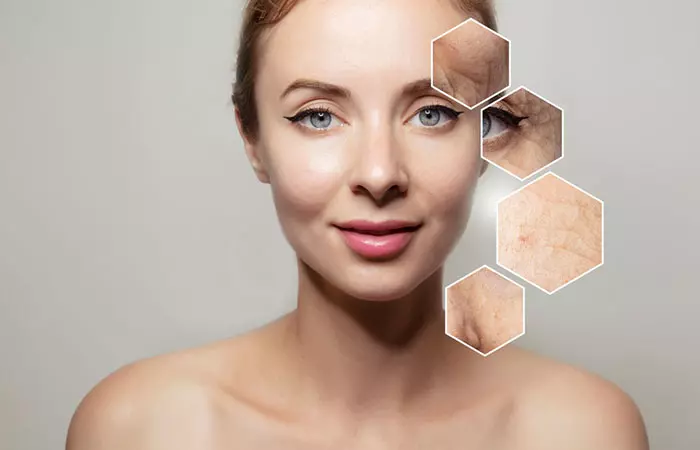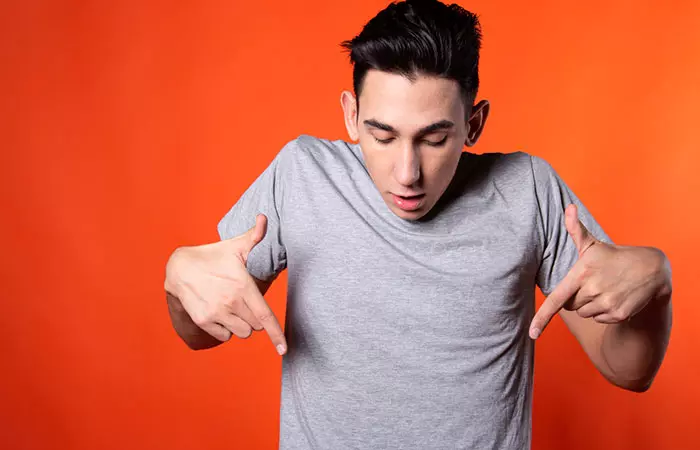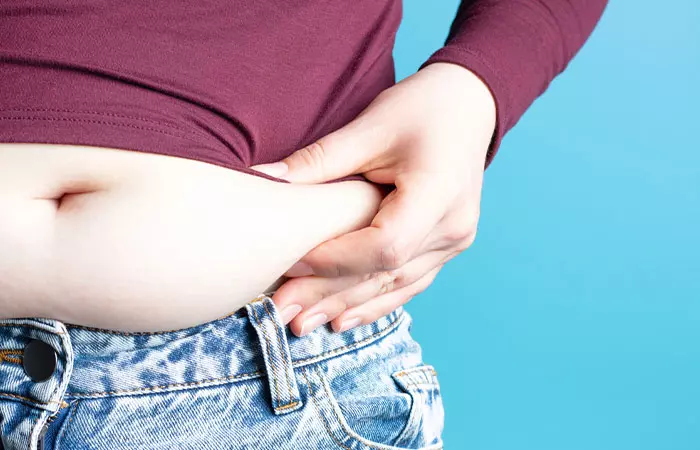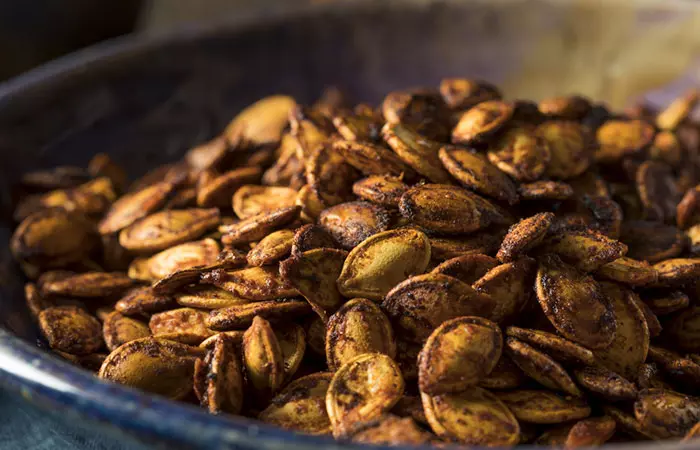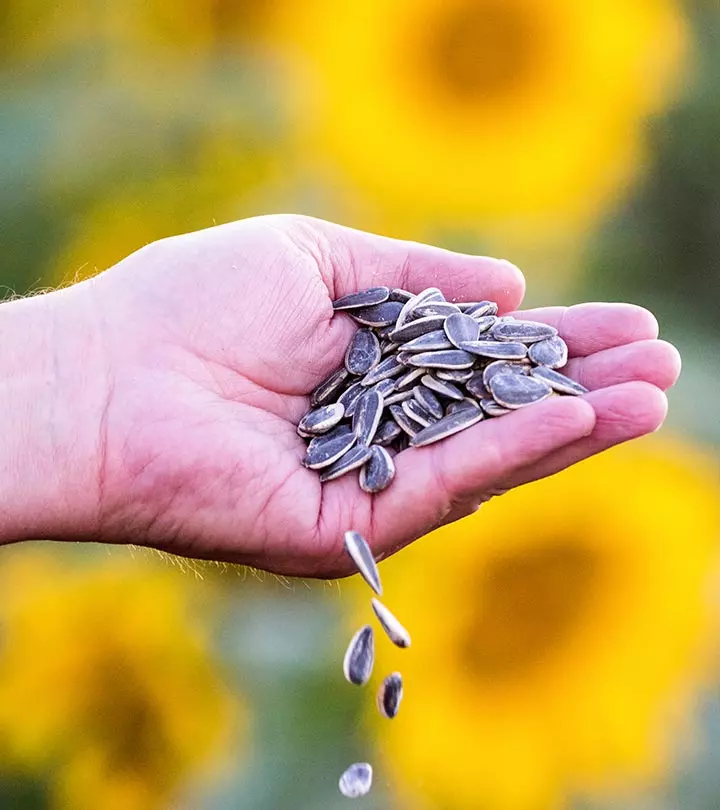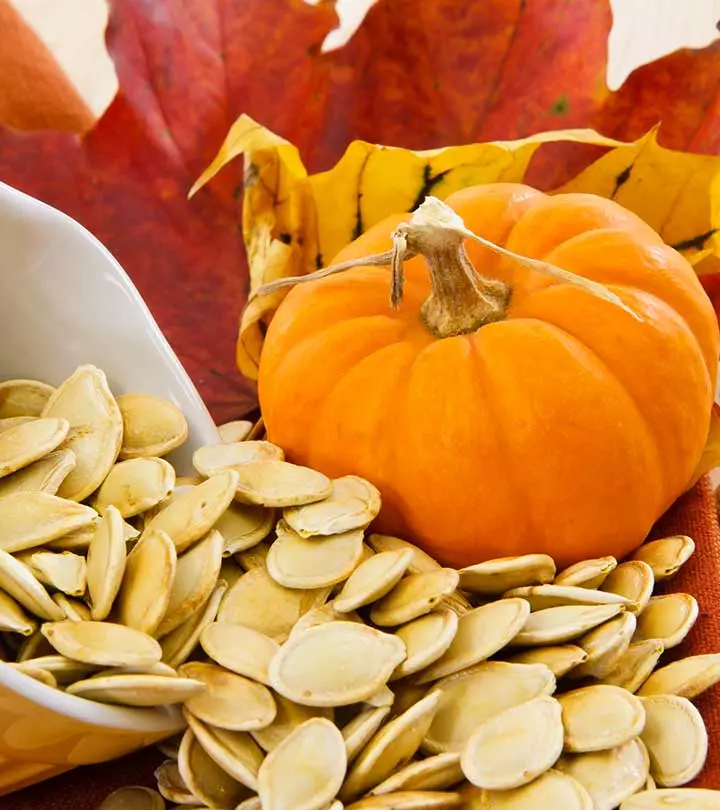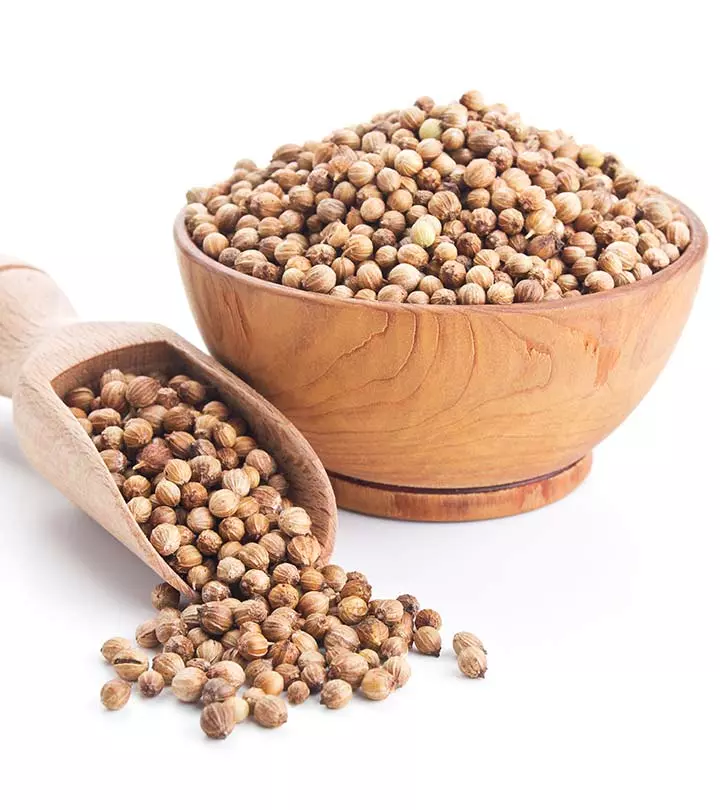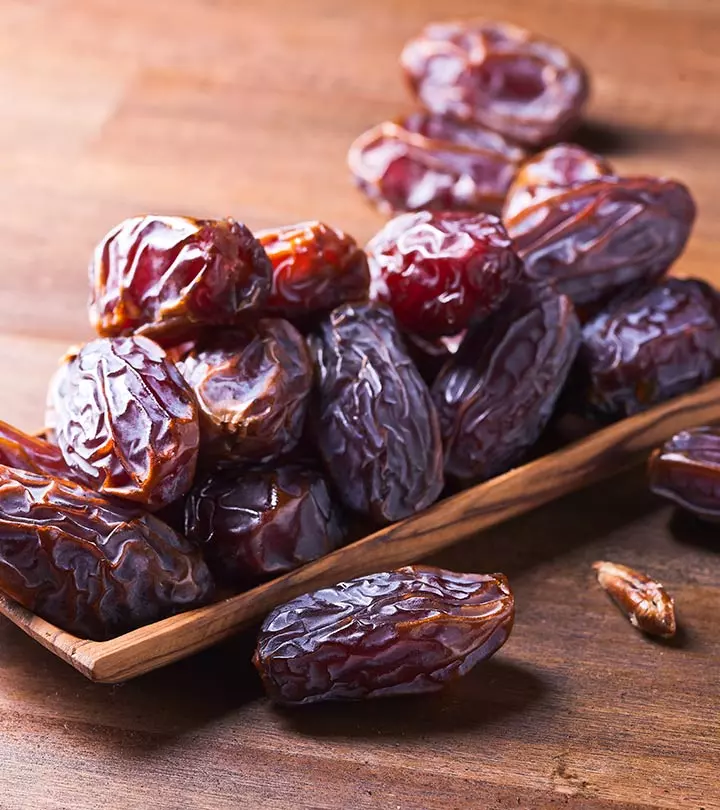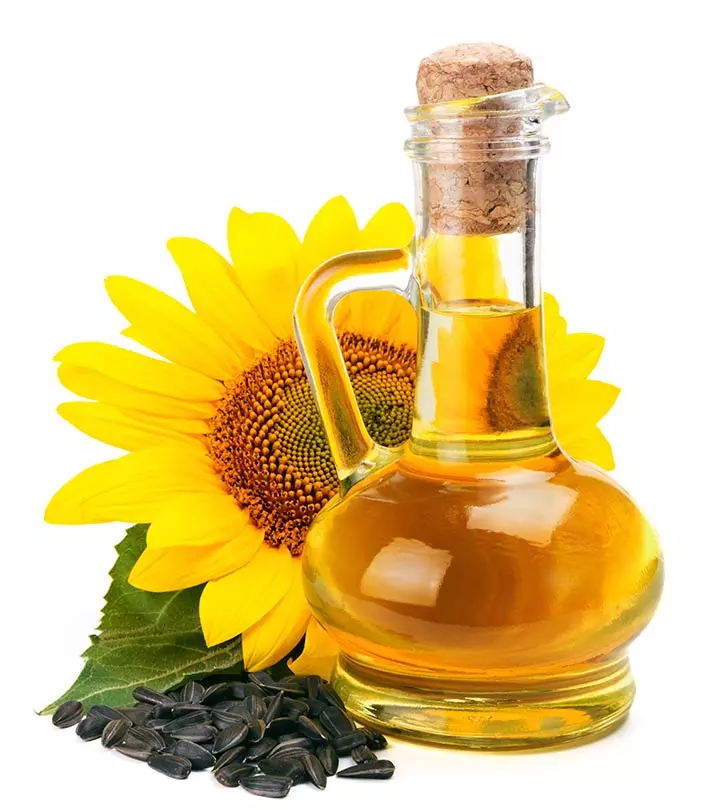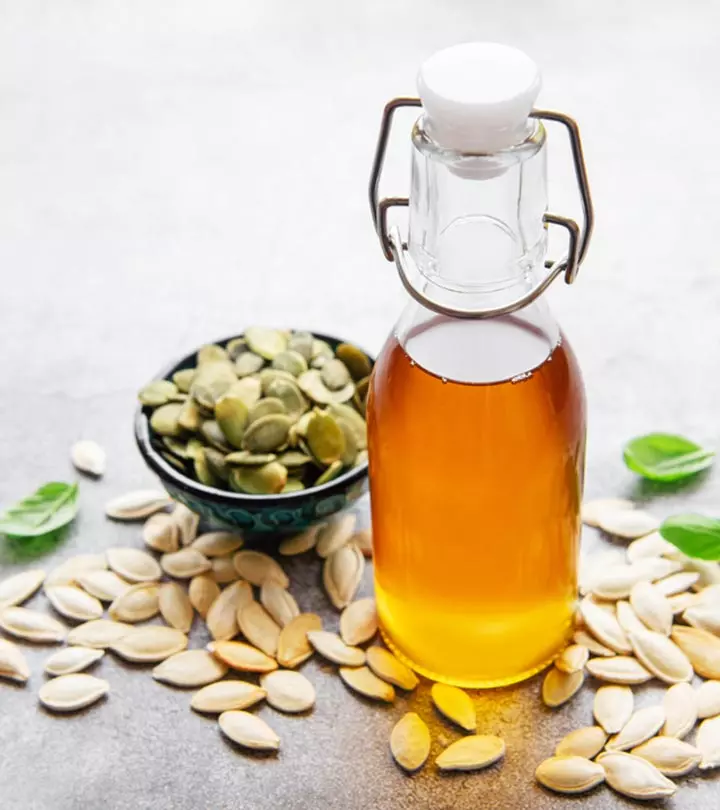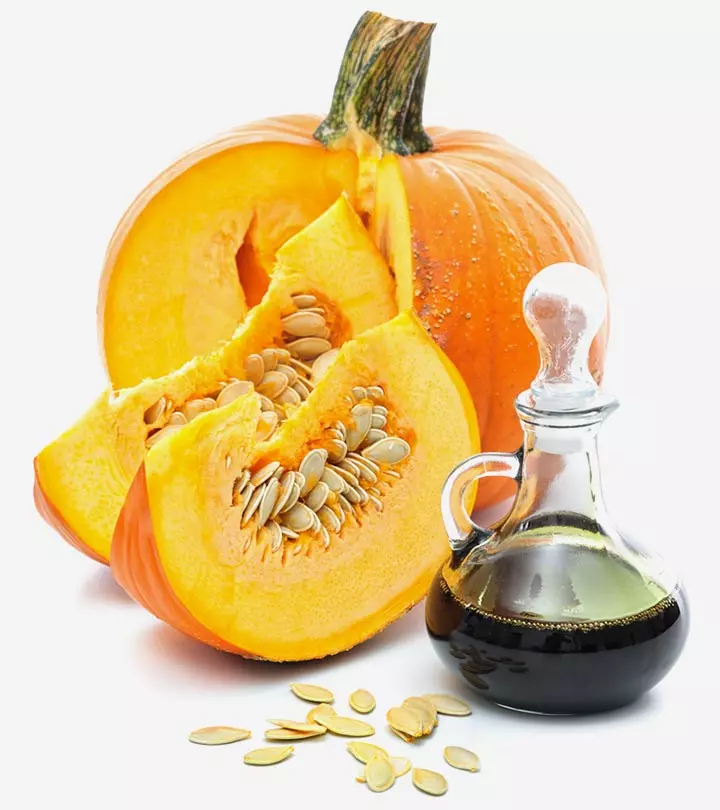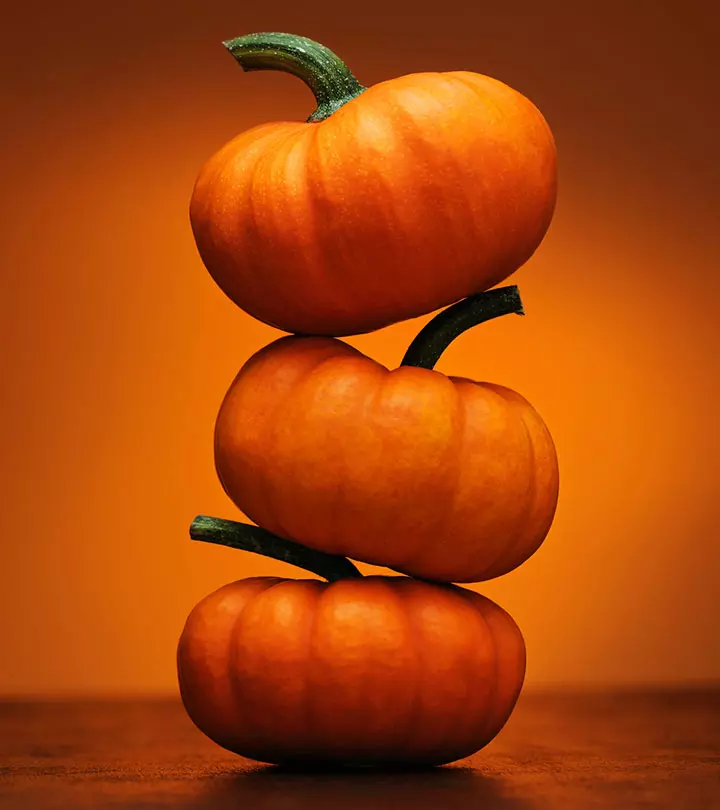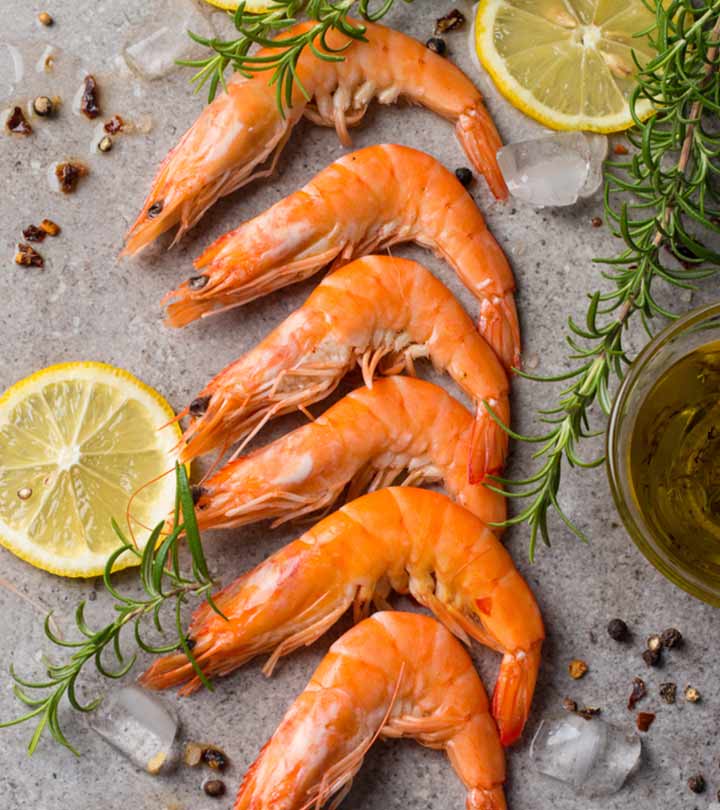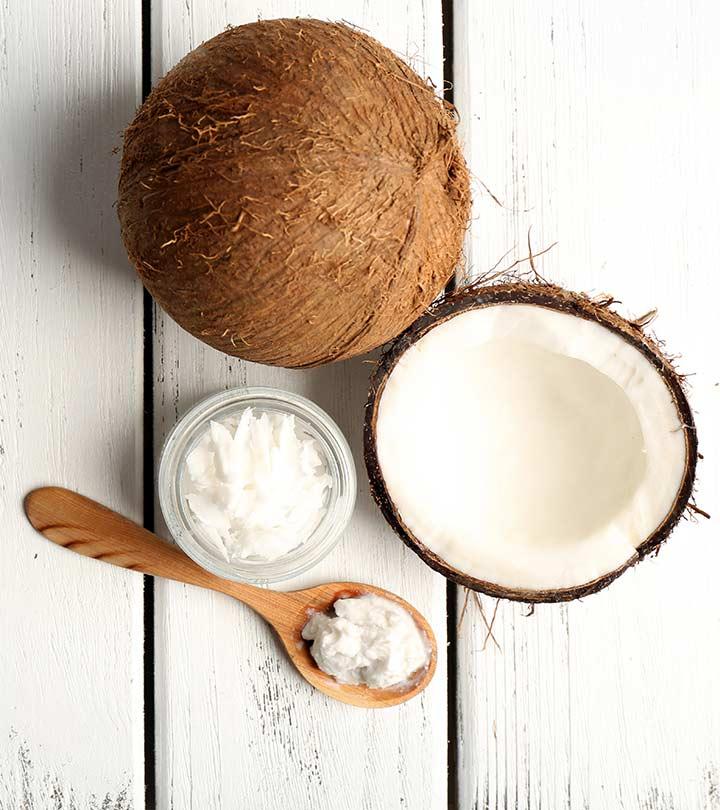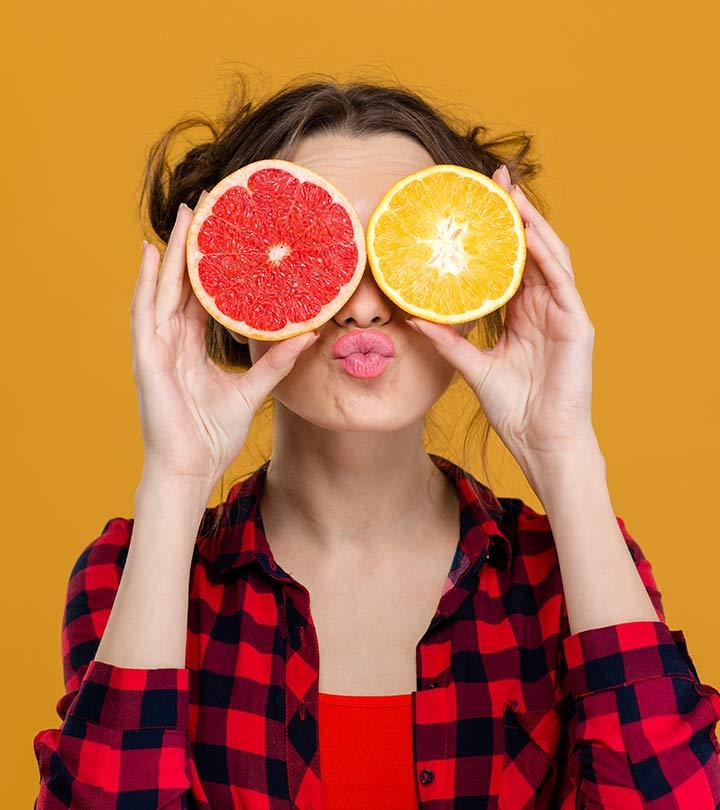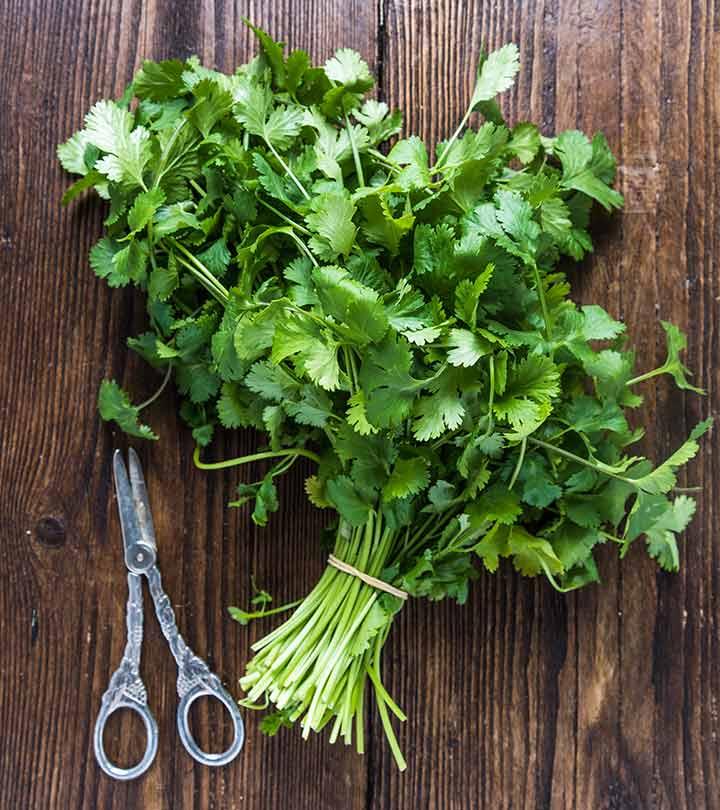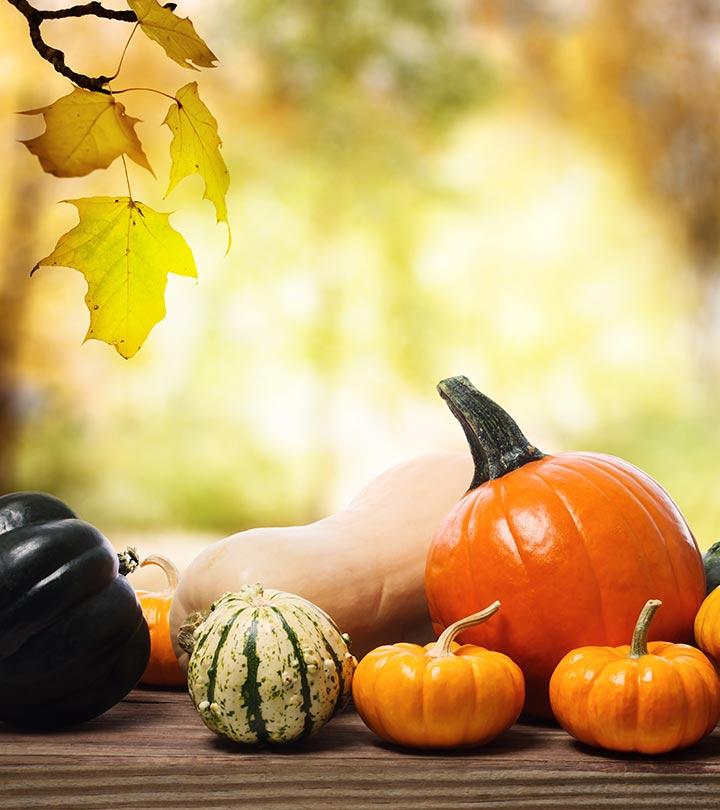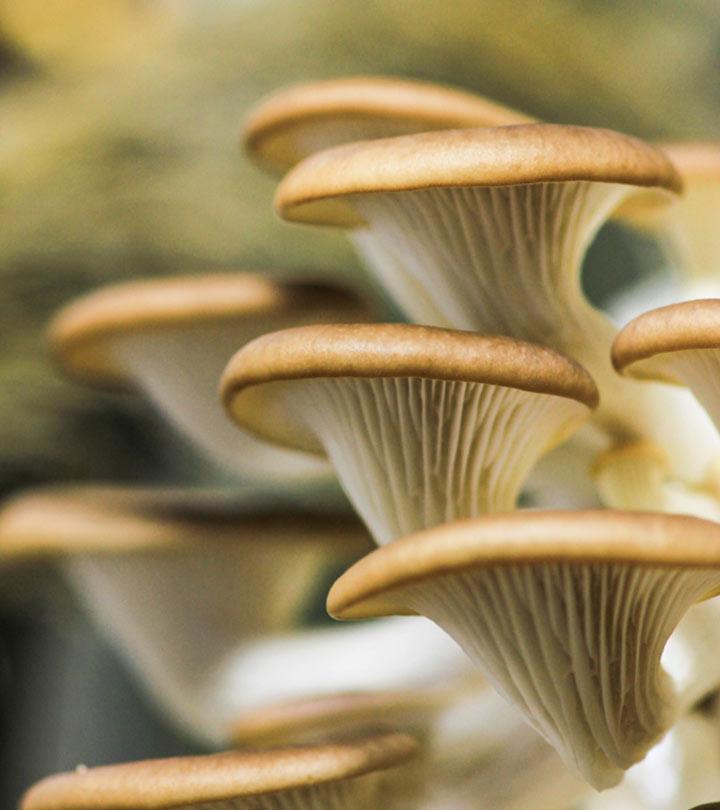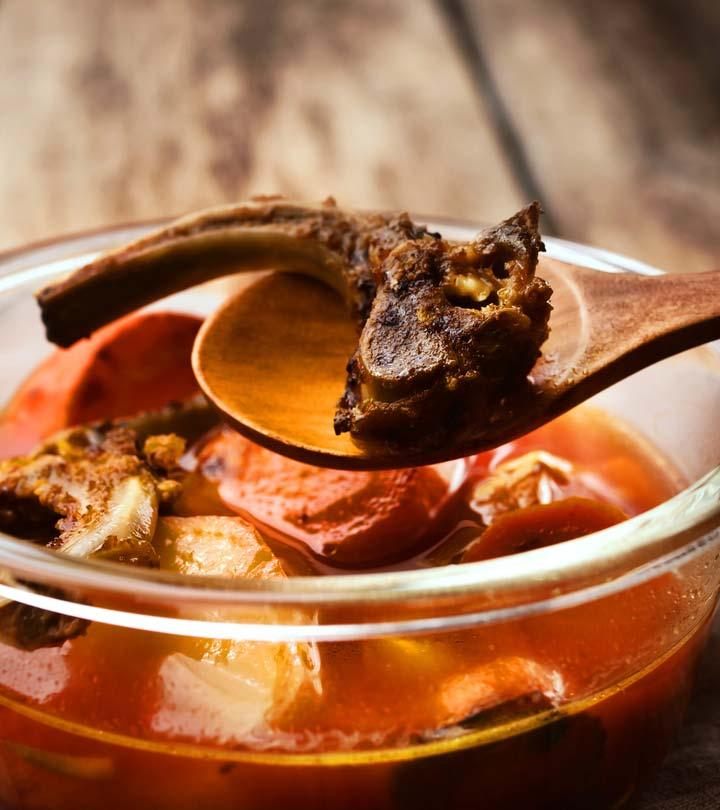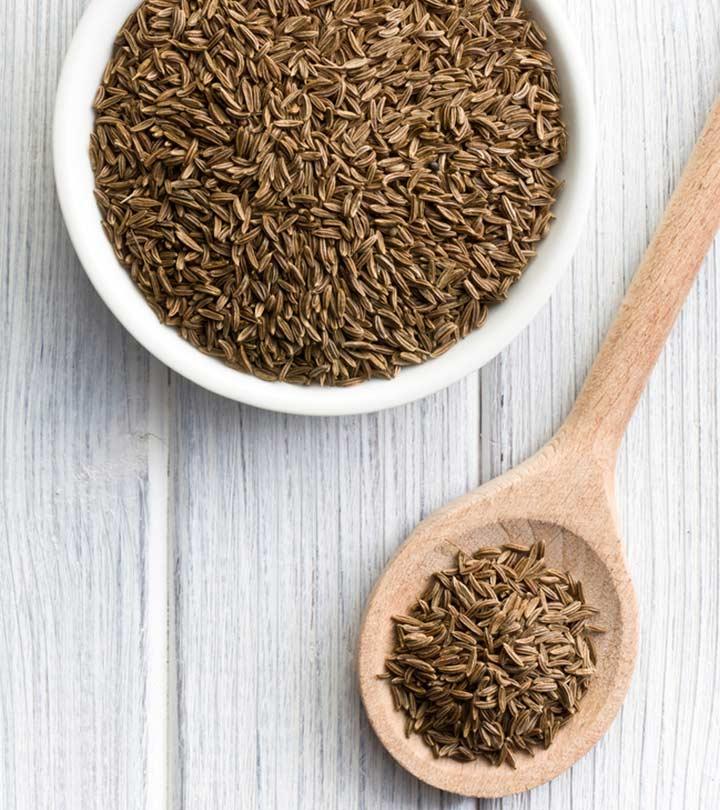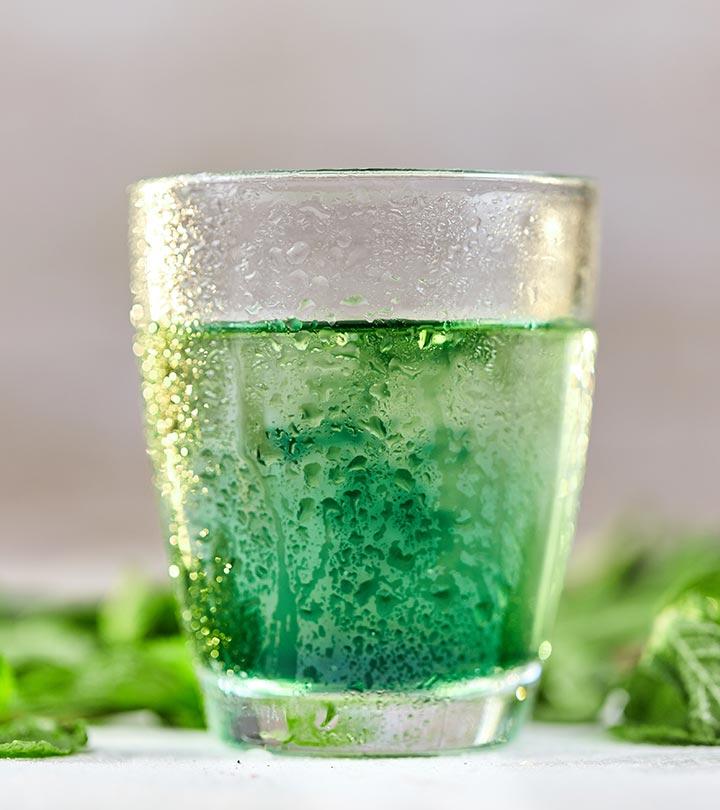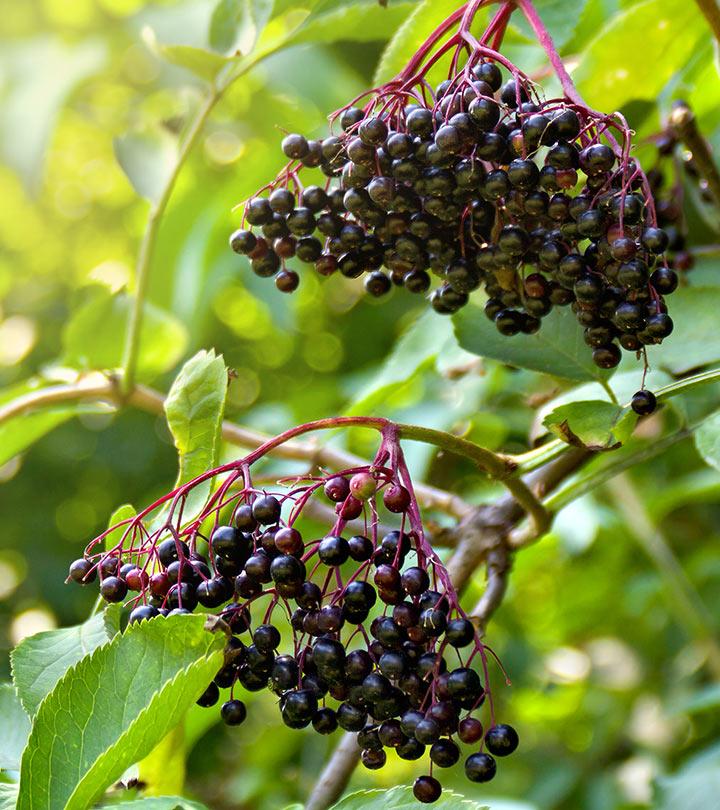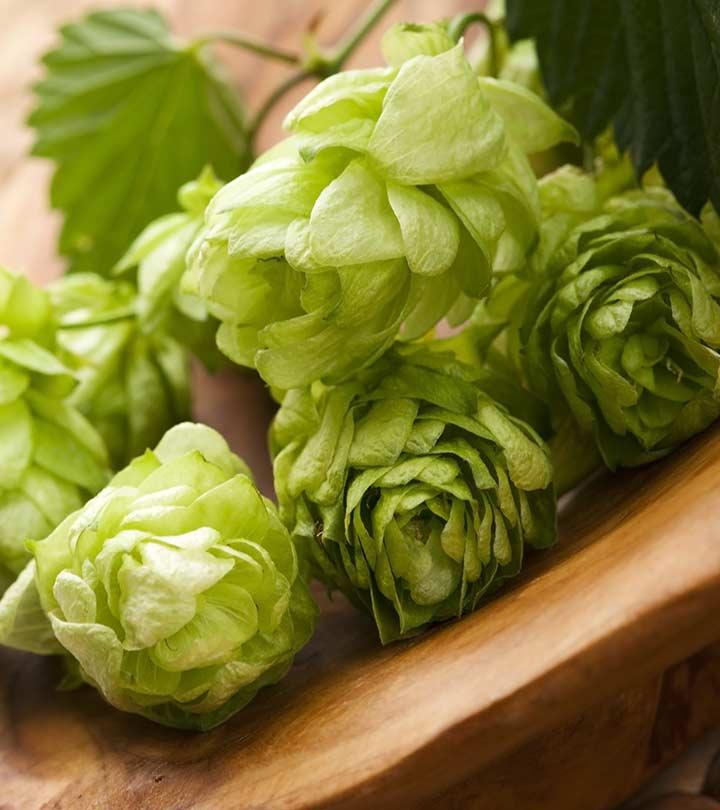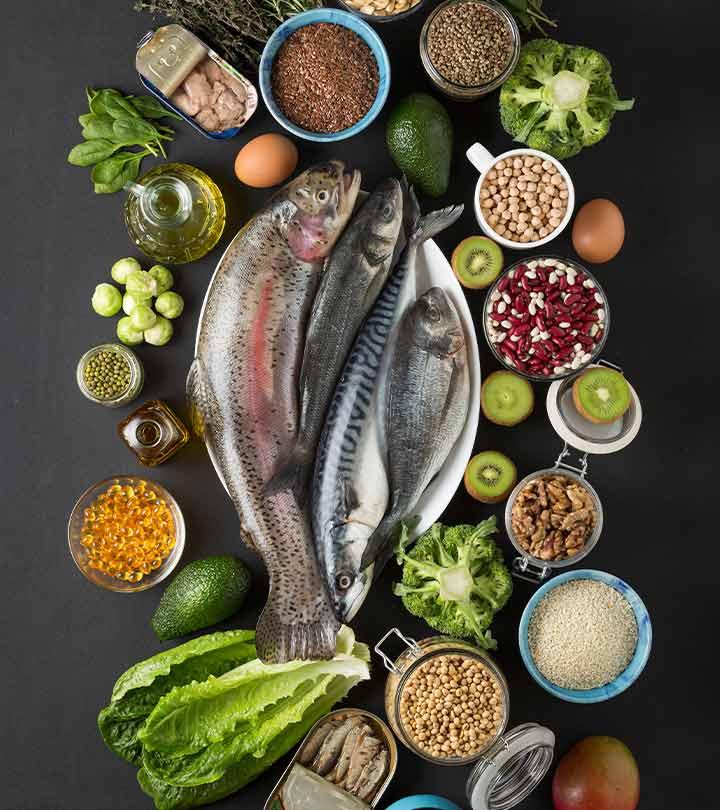7 Benefits Of Pumpkin Seeds, Nutrition, And How To Use Them
Enjoy the health-boosting properties of these seeds and watch your body flourish in no time.
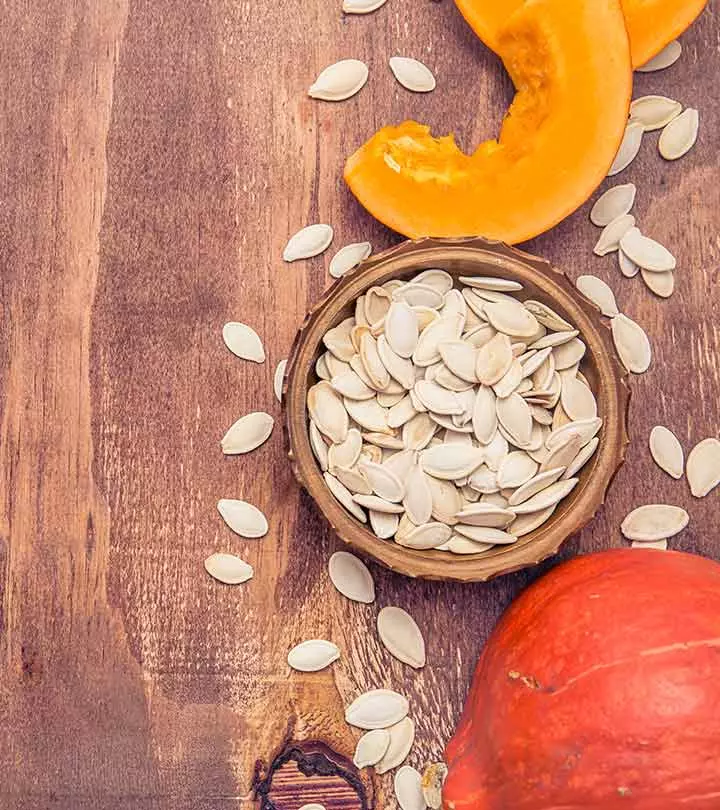
Image: Shutterstock
Snacking on pumpkin seeds is a regular ritual for people watching their weight and fitness freaks. And why not? Pumpkin seeds are superfoods that benefit you in multiple ways as they are loaded with many amazing nutrients, like phosphorous, zinc, iron, potassium, essential amino acids, and unsaturated fatty acids.
Additionally, these seeds offer an array of health benefits like reducing the risk of cardiovascular disorders, alleviating bone/muscle pain, minimizing hair fall and acne, improving the immune system, and diabetes management.
Keep reading to learn more about the benefits of pumpkin seeds. Keep scrolling!
 Know Your Ingredient: Pumpkin Seeds
Know Your Ingredient: Pumpkin SeedsWhat Is It?
It is the edible seed of the pumpkin fruit.
What Are Its Benefits?
It reduces the risk of cancer and inflammatory diseases, improves skin health, delays skin aging, improves heart, prostate, and kidney health, and may prevent hair breakage and hair loss.
Who Can Use It?
Can be safely consumed by both adults and children.
How Often?
15 to 30 grams/day
Caution
Overconsumption may cause gas and bloating.
In This Article
Why Should You Eat Pumpkin Seeds?
Pumpkin seeds (Cucurbita pepo L.) are natural reserves of fats and proteins. They are rich in oil (50%) too. Palmitic (≤15%), stearic (≤8%), oleic (≤47%), and linoleic (≤61%) fatty acids make up the oil (1).
Hence, pumpkin seeds fall into the category of nutritious oil seeds, along with sunflower, soybean, safflower, and watermelon seeds (1).
Pumpkin seeds are growing popular as a rich source of nutrition. They are being sold as a snack mixed with various nuts, seeds, and dried fruits.
The high levels of oleic and linoleic fatty acids in pumpkin seeds may reduce the risk of heart diseases. They possess fair amounts of minerals like potassium, magnesium, zinc, manganese, and copper (1), (2).
 Trivia
TriviaMoreover, these seeds contain significant amounts of antioxidants in the form of phytochemicals (1), (2).
Studies prove that these elements may combat gastric, breast, lung, and colorectal cancers (1).
Go through the next section to know what pumpkin seeds do to your body. You can also find suitable scientific evidence for pumpkin seeds benefits.
How Do Pumpkin Seeds Benefit Your Health?
Pumpkin seeds have antioxidant, anti-inflammatory, antimicrobial, anti-arthritici A property or a specific drug type that helps relieve arthritic symptoms of the bone and cartilage, like swelling, pain, and stiffness. , and antidiabetic properties. Extensive research also linked the consumption of these seeds to lower the risk of cancer and UTIs.
1. May Possess Anticancer Properties
Folk medicine used pumpkin seed extracts to treat kidney, bladder, and prostate disorders for centuries. The active molecules, like cucurbitin, inhibit the rapid growth of cancer cells (3).
Experimental studies noted about 40-50% of growth inhibition in prostate, breast, and colon cancer cells. This could be due to the presence of estrogen-like molecules (phytoestrogens) in pumpkin seeds (3).
Compounds like lignans and flavones alter the expression of genes mainly involved in the prevention/management of breast and prostate cancers.
2. May Nourish And Repair Skin
Pumpkin seeds and their oil are excellent skin care agents. The bright orange pigment-producing molecules, called carotenoids, have anti-aging effects. They scavenge free radicals that cause premature aging of the skin (4).
Vitamins A and C in the seeds boost the production of collagen. Collagen helps in wound healing and keeps your skin young and wrinkle-free. The oil has omega-3 fatty acids and ß-carotene. These components are potent anti-inflammatory agents (4), (5), (6).
Using pumpkin seed oil as a topical agent can treat acne, blisters, and chronic inflammation of the skin. It also prevents bacterial and fungal infections when used as a scrub, lotion, or when massaged (4).
3. May Prevent Cardiovascular Diseases
Several animal studies demonstrate the positive effects of pumpkin seed supplementation on heart health. Subjects on a high-fat diet showed a significant decrease in the levels of total cholesterol (7).
The seeds could also lower the levels of LDL (bad cholesterol) by about 79% in the subjects. The studies also report a drop in the levels of inflammatory markers like nitric oxide (7).
Another study on 889 subjects in Slovakia revealed that the consumption of pumpkin seeds can reduce the risk of cardiovascular diseases. It was seen that around 53.06% of men commonly consumed pumpkin seeds, which was greater than women, who consumed 45.19 percent regularly. The study also highlighted that seeds can reduce body mass index and lipid profile.
Adding pumpkin seeds to your diet can prevent cholesterol accumulation and hardening of the blood vessels. This prevents various heart issues like coronary artery disease, stroke, etc. (7)
4. May Improve Prostate Health
Pumpkin seeds have a notable protective effect on the prostate gland. The prostate is said to store minerals, like zinc. These minerals prevent issues like prostate enlargement (hyperplasia) induced by testosterone imbalance (8), (9).
As they contain useful amounts of zinc, these seeds and oil have shown to inhibit prostate enlargement. Lab trials suggest that oil-free pumpkin seeds may help manage benign prostatic hyperplasiai A medical condition characterized by the enlargement of the prostate gland and surrounding tissues in aging men. (9), (10).
By managing hyperplasia, the male subjects would have less urine retention. This would lessen the risk of urinary tract infections (10).
5. May Treat Urinary Tract Infections (UTIs)
The pumpkin seed oil has been useful to treat urinary disorders, especially in men. It does so by inhibiting issues like prostate enlargement. Clinical trials have proved that this oil is well-tolerated (11).
Large doses of about 500-1000 mg/day did not trigger undesirable effects. In fact, when subjects with overactive bladder were given this dose for 6 and 12 weeks, their urinary function significantly improved (11).
6. May Promote Hair Growth
These seeds contain good amounts of omega-3 fatty acids. Along with other micronutrients, these fatty acids aid in improving the texture of dry and brittle hair. Zinc is another factor that boosts the production of hair proteins. Pumpkin seeds contain zinc in abundance (12).
Twenty four weeks of treatment with pumpkin seed oil increased hair growth by about 40% in men with baldness. This could happen because the seeds have active molecules called phytosterols. They inhibit the enzymes (proteins) that breakdown hair protein and cause hair fall (13), (14).
7. May Help Manage Diabetes
Pumpkin seeds exhibit active antidiabetic effects. They possess phytochemicals, such as flavonoids and saponins, that effectively control blood glucose levels. These molecules prevent the inflammation of insulin-producing pancreatic cells (14), (15).
Animal studies show that a diet rich in flax and pumpkin seeds enhances the antioxidant enzyme activity. In subjects with diabetes, these enzymes rapidly scavenge the free radicals and thus lessen the impact on the kidneys and pancreas (16).
Not just the seeds, pumpkin leaves and pulp have also been identified to possess antidiabetic properties. The fruit contains complex carbohydrates like pectin, which may help regulate your sugar levels (17).
Trivia
- Pumpkin seeds have high levels of magnesium. Eating them or using the oil may relieve muscle cramps, bone pain, arthritis, and inflammation. This mineral also boosts memory and cognition (18).
- Along with magnesium, pumpkin seeds are also rich in an amino acid called tryptophan. Tryptophan relieves anxiety and promotes sleep. This happens because it triggers the release of a ‘feel-good’ neurotransmitter, serotonin (19).
- These seeds contain high levels of phosphorus. Phosphorus can eliminate the insoluble compounds in food or those accumulated in your body, like calcium oxalate. Thus, consuming pumpkin seeds may help in lowering the risk of bladder stones.
8. May Lower Cholesterol And Risk Of Obesity
High/abnormal lipid levels are linked to cardiovascular diseases, obesity, and even death. Eating foods that control the metabolism, accumulation, and excretion of lipids, like cholesterol, is the easiest way to avoid such disorders.
Pumpkin seeds are rich sources of good fats, fiber, and antioxidants. Along with other plant seeds like flax and purslane, pumpkin seeds can prevent body weight gain and cholesterol accumulation in the liver as well as aid weight loss (20).
The strong anti-obesity effect of these seeds is attributed to the presence of omega-3 fatty acids, phytosterols, vitamin-E derivatives, and ß-carotene. Linoleic, linolenic, and oleic acids help lower blood cholesterol levels (20).
They also maintain kidney and liver functioning in obese/overweight individuals (20).
However, most of the studies have been done on rats, and the dosage for humans may vary.
To know the distribution of these phytonutrients in pumpkin seeds, check out the next section.
Nutritional Details Of Pumpkin Seeds
| Nutrient | Unit | 1 cup (64 g) |
|---|---|---|
| Proximates | ||
| Water | g | 2.88 |
| Energy | kcal | 285 |
| Protein | g | 11.87 |
| Total lipid (fat) | g | 12.42 |
| Carbohydrate, by difference | g | 34.4 |
| Fiber, total dietary | g | 11.8 |
| Minerals | ||
| Calcium, Ca | mg | 35 |
| Iron, Fe | mg | 2.12 |
| Magnesium, Mg | mg | 168 |
| Phosphorus, P | mg | 59 |
| Potassium, K | mg | 588 |
| Sodium, Na | mg | 12 |
| Zinc, Zn | mg | 6.59 |
| Copper, Cu | mg | 0.442 |
| Manganese, Mn | mg | 0.317 |
| Vitamins | ||
| Vitamin C, total ascorbic acid | mg | 0.2 |
| Thiamin | mg | 0.022 |
| Riboflavin | mg | 0.033 |
| Niacin | mg | 0.183 |
| Pantothenic acid | mg | 0.036 |
| Vitamin B-6 | mg | 0.024 |
| Folate, total | µg | 6 |
| Folate, food | µg | 6 |
| Folate, DFE | µg | 6 |
| Vitamin A, RAE | µg | 2 |
| Vitamin A, IU | IU | 40 |
| Lipids | ||
| Fatty acids, total saturated | g | 2.349 |
| 12:00 | g | 0.012 |
| 14:00 | g | 0.014 |
| 16:00 | g | 1.519 |
| 18:00 | g | 0.761 |
| Fatty acids, total monounsaturated | g | 3.86 |
| 16:1 undifferentiated | g | 0.027 |
| 18:1 undifferentiated | g | 3.83 |
| Fatty acids, total polyunsaturated | g | 5.66 |
| 18:2 undifferentiated | g | 5.606 |
| 18:3 undifferentiated | g | 0.049 |
| Cholesterol | mg | 0 |
| Amino Acids | ||
| Tryptophan | g | 0.209 |
| Threonine | g | 0.437 |
| Isoleucine | g | 0.612 |
| Leucine | g | 1.006 |
| Lysine | g | 0.887 |
| Methionine | g | 0.267 |
| Cystine | g | 0.146 |
| Phenylalanine | g | 0.591 |
| Tyrosine | g | 0.493 |
| Valine | g | 0.954 |
| Arginine | g | 1.951 |
| Histidine | g | 0.33 |
| Alanine | g | 0.56 |
| Aspartic acid | g | 1.199 |
| Glutamic acid | g | 2.088 |
| Glycine | g | 0.869 |
| Proline | g | 0.484 |
| Serine | g | 0.556 |
| Other | ||
Now you know why health-freaks obsess over these seeds.
With all these nutrients, pumpkin seeds taste nutty and delicious. You can nibble on the roasted/toasted seeds as a guilt-free snack.
Here’s how you make them.
How To Prepare Roasted Pumpkin Seeds Snack
What You Need
- Pumpkin seeds: 2 cups
- Water: 1 liter
- Salt: 2 tablespoons
- Unsalted butter, melted: 1 tablespoon
- Mixing bowl: medium-sized
- Cookie sheet or Frying pan: medium-large
Let’s Make It!
- Preheat the oven to 250°F.
- Prepare the pumpkin seeds. Remove any cut seeds and as much of the stringy fibers as possible.
- Add 1 liter of water and salt to a suitable vessel and bring it to a boil.
- Add the cleaned pumpkin seeds.
- Boil for 10 minutes.
- Drain the water and spread the seeds on a clean kitchen/paper towel.
- Pat the seeds dry.
- Transfer the well-dried seeds to a mixing bowl.
- Add the melted butter. Toss the seeds to coat with butter uniformly.
- Spread the coated seeds evenly on a large cookie sheet or roasting pan.
- Place the pan in the preheated oven. You can also do the following steps on a stove.
- Roast the seeds for 30-40 minutes or until crisp and golden brown.
- Stir about every 10 minutes while roasting.
- Cool the seeds.
- Shell the kernels off and chomp on the seeds.
- You can also store them in an airtight container or zip-lock bag for future use. The seeds can be refrigerated in this condition too.
Yen, a blogger, cherishes every part of the pumpkin, repurposing the seeds into a delightful snack. Her recipe for roasted pumpkin seeds involves separating them from the pulp, rinsing, and drying before drizzling olive oil and salt on them. The seeds are then roasted until lightly golden. She notes in her blog, “Roasted pumpkin seeds have a lovely nutty flavor and are great as a snack besides having a multitude of health benefits.” However, she also offers a word of caution on the roasting process, stating, “Do keep an eye after 10 minutes as you just want to lightly roast them as overroasting destroys some of their nutritive value (i).”
How To Make Pumpkin Seed Brittle
What You Need
- Pumpkin seeds: 1 cup
- Honey: ¼ cup
- Light-brown sugar: ½ cup
- Unsalted butter: ¼ cup
Let’s Make It!
- Preheat the oven to 350°F.
- Grease a baking sheet and set it aside.
- In a small saucepan, melt the unsalted butter over medium heat.
- Add sugar and honey to the melted butter and bring the mixture to a boil.
- Allow the mixture to boil without stirring for approximately 6 minutes until it turns a medium-amber color.
- Add the pumpkin seeds to the mixture and stir to combine.
- Continue cooking until the mixture reaches 300°F (approximately 2 minutes).
- Pour the mixture onto the prepared baking sheet.
- Let it cool completely before breaking it into pieces for serving.
You can also sprinkle these seeds over salads, soups, porridges, breakfast cereal, and pasta.
 Trivia
TriviaBut, is it safe to eat these seeds every day? If it is not, what is a safe serving size?
Is It Safe To Eat Pumpkin Seeds? How Much Is Safe?
There is no scientific study demonstrating the side effects of these seeds. In rare cases, an overdose may cause constipation and bloating.
Also, not enough research has been done to establish a safe intake limit of pumpkin seeds. Though they are generally considered safe for pregnant and lactating women, there is no scientific basis to prove this.
Therefore, it is advisable to consult your healthcare provider for information on the safety and
Infographic: How To Add Pumpkin Seeds To Your Diet
Pumpkin seeds can be eaten raw or roasted and are easily included in your diet. Adding these seeds to the food items can offer extra crunchiness and taste to them. Click on the infographic below to know how to include pumpkin seeds in your diet. Illustration: StyleCraze Design Team
Spinach juice is a rich source of protein and many essential nutrients. In addition, it is high in antioxidants and many other beneficial compounds. Spinach juice may prevent anemia, relieve rheumatoid arthritis, maintain the body’s alkaline levels, help treat bleeding gums, and fight against certain cancer cells. It can also keep your skin supple and hydrated and promote strong and healthy hair, resulting in improved skin health as well as hair health. Consume this healthy drink to reap its maximum benefits.
Frequently Asked Questions
Should pumpkin seeds be soaked?
Pumpkin seeds have a thin membrane that contains enzymes that are hard to digest. Hence, soak them for 12-24 hours before eating.
Can you eat pumpkin seeds on an empty stomach?
Yes. Consuming pumpkin seeds on an empty stomach may help detoxify the body.
Which is better: raw or roasted pumpkin seeds?
Raw pumpkin seeds offer more nutrition value than roasted ones.
Key Takeaways
- Consuming pumpkin seeds may lower your risk of developing heart disorders as it contains protective healthy fats like linoleic fatty acid.
- They may help prevent the onset and development of cancer cells with the aid of beneficial compounds like cucurbitin.
- Pumpkin seeds have an abundance of zinc, an essential nutrient required to nourish and maintain healthy hair.
- Pumpkin seed oil can also be used topically to help treat acne and skin inflammation.
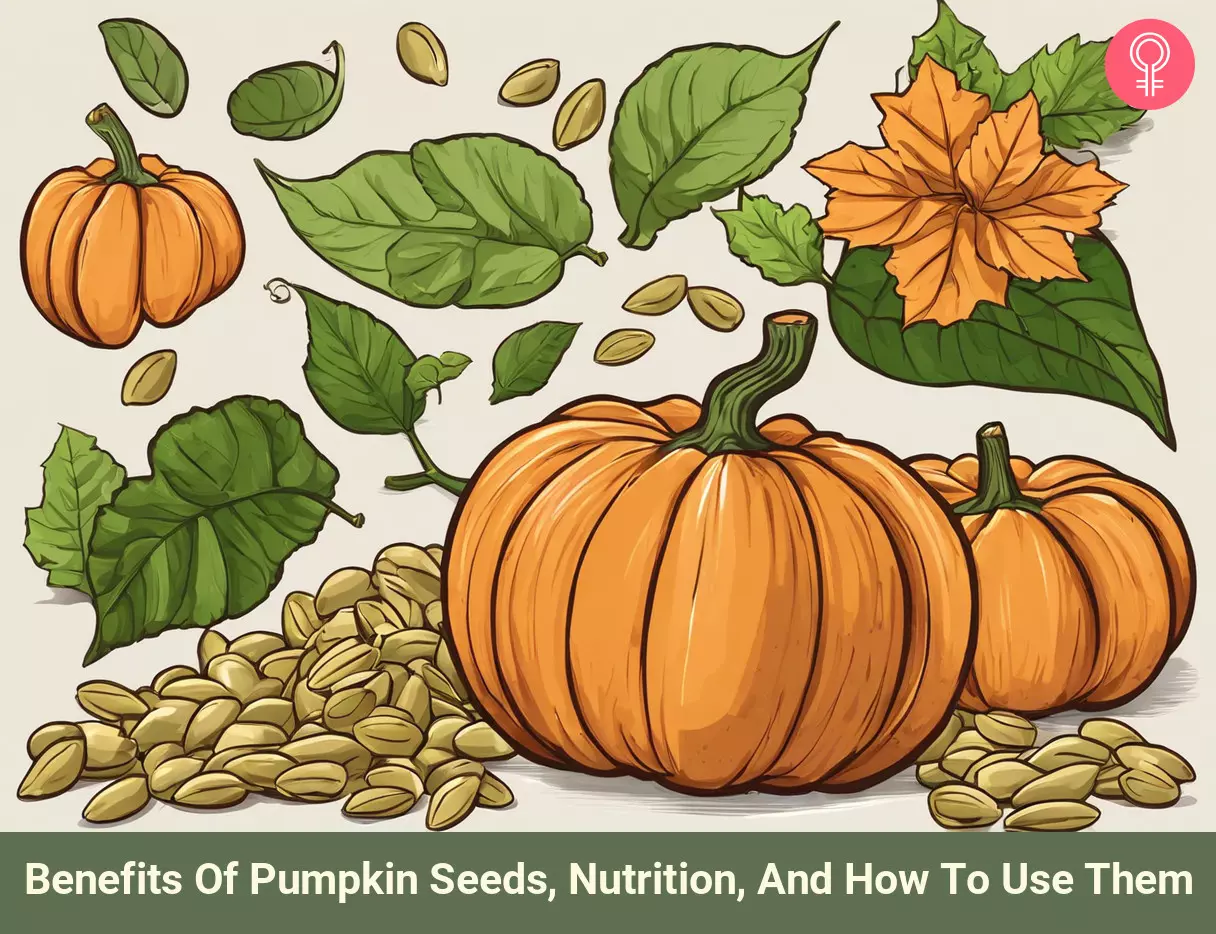
Image: Stable Diffusion/StyleCraze Design Team
References
Articles on StyleCraze are backed by verified information from peer-reviewed and academic research papers, reputed organizations, research institutions, and medical associations to ensure accuracy and relevance. Read our editorial policy to learn more.
- Health Benefits of Pumpkin Seed and Nutrition Profile of 35 Pumpkin Accessions, EDIS, IFAS Extension, The Institute of Food and Agricultural Sciences, Department of Agriculture, University of Florida.
https://edis.ifas.ufl.edu/hs1312 - Amino acid, mineral and fatty acid content of pumpkin seeds (Cucurbita spp) and Cyperus esculentus nuts in the Republic of Niger, Plant foods for human nutrition, US National Library of Medicine.
https://pubmed.ncbi.nlm.nih.gov/16770692/ - Pumpkin seed extract: Cell growth inhibition of hyperplastic and cancer cells, independent of steroid hormone receptors, Fitoterapia, US National Library of Medicine, National Institutes of Health.
https://www.ncbi.nlm.nih.gov/pubmed/26976217Physicochemical - Properties of Pumpkin Seed Oil & Therapy of Inflammatory Facial Acne Vulgaris, International Journal of Science and Research, Academia
https://www.academia.edu/34454984/Physicochemical_Properties_of_Pumpkin_Seed_Oil_and_Therapy_of_Inflammatory_Facial_Acne_Vulgaris - Oil from pumpkin (Cucurbita pepo L.) seeds: evaluation of its functional properties on wound healing in rats, Lipids in Health and Disease, US National Library of Medicine, National Institutes of Health.
https://www.ncbi.nlm.nih.gov/pmc/articles/PMC4827242/ - PUMPKIN, PUMPKIN, PUMPKIN FOR BEAUTY, American Institute of Beauty, Inc.
https://aibschool.edu/pumpkin-pumpkin-pumpkin-for-beauty/ - The Effect of Pumpkin (Cucurbita Pepo L) Seeds and L-Arginine Supplementation on Serum Lipid Concentrations in Atherogenic Rats, African Journal of Traditional, Complementary, and Alternative Medicine, US National Library of Medicine, National Institutes of Health.
https://www.ncbi.nlm.nih.gov/pmc/articles/PMC3746528/ - Protect Your Prostate, Health & Wellness, Rush University Medical Center.
https://www.rush.edu/news/protecting-prostate - Inhibition of testosterone-induced hyperplasia of the prostate of sprague-dawley rats by pumpkin seed oil, Journal of Medicinal Food, US National Library of Medicine, National Institutes of Health.
https://www.ncbi.nlm.nih.gov/pubmed/16822218 - Effects of an Oil-Free Hydroethanolic Pumpkin Seed Extract on Symptom Frequency and Severity in Men with Benign Prostatic Hyperplasia: A Pilot Study in Humans, Journal of Medicinal Food, US National Library of Medicine, National Institutes of Health.
https://www.ncbi.nlm.nih.gov/pmc/articles/PMC6590724/ - Pumpkin Seed Oil Extracted From Cucurbita maxima Improves Urinary Disorder in Human Overactive Bladder, Journal of Traditional and Complementary Medicine, US National Library of Medicine, National Institutes of Health.
https://www.ncbi.nlm.nih.gov/pmc/articles/PMC4032845/ - 10 Foods That Promote Healthy Hair, Sylvain Melloul International Hair Academy.
https://smiha.edu/10-foods-that-promote-healthy-hair/ - Hair-growth promoting activity of plant extracts of suruhan (Peperomia pellucida) in Rabbits, IOSR Journal of Pharmacy and Biological Sciences, Academia.
https://www.academia.edu/36647740/Hair-growth_promoting_activity_of_plant_extracts_of_suruhan_Peperomia_pellucida_in_Rabbits - A comprehensive review of the versatile pumpkin seeds (Cucurbita maxima) As A valuable natural medicine, International Journal of Current Research, Academia.
https://www.academia.edu/31623233/A_COMPREHENSIVE_REVIEW_OF_THE_VERSATILE_AS_A_VALUABLE_NATURAL_MEDICINE - The hypoglycemic effect of pumpkin seeds, Trigonelline (TRG), Nicotinic acid (NA), and D-Chiro-inositol (DCI) in controlling glycemic levels in diabetes mellitus, Critical Reviews in Food Science and Nutrition, US National Library of Medicine, National Institutes of Health.
https://www.ncbi.nlm.nih.gov/pubmed/24564589 - Flax and Pumpkin seeds mixture ameliorates diabetic nephropathy in rats, Food and Chemical Toxicology, US National Library of Medicine, National Institutes of Health.
https://www.ncbi.nlm.nih.gov/pubmed/20570704 - The hypoglycaemic effect of pumpkins as anti-diabetic and functional medicine, Food Research International, Academia.
https://www.academia.edu/26212315/The_hypoglycaemic_effect_of_pumpkins_as_anti-diabetic_and_functional_medicines - What Should I Eat for My Specific Condition?, Taking Charge of your Health & Wellness, University of Minnesota.
https://www.takingcharge.csh.umn.edu/what-should-i-eat-my-specific-condition - Pumpkin Benefits, Get-U-Fit blog, Warhawk Fitness & Aquatics, University of Wisconsin-Whitewater.
https://blogs.uww.edu/warhawkfitness/2016/11/09/pumpkin-benefits/ - The antiatherogenic, renal protective and immunomodulatory effects of purslane, pumpkin and flax seeds on hypercholesterolemic rats, North American Journal of Medical Sciences, US National Library of Medicine, National Institutes of Health.
https://www.ncbi.nlm.nih.gov/pmc/articles/PMC3271396/
Read full bio of Madhu Sharma
Read full bio of Ravi Teja Tadimalla
Read full bio of Aparna Mallampalli





